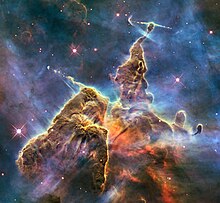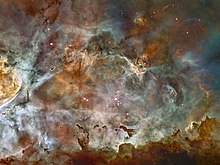Mystic Mountain


Mystic Mountain is a photograph and a term for a region in the Carina Nebula imaged by the Hubble Space Telescope. The view was captured by the then-new Wide Field Camera 3, though the region was also viewed by the previous generation instrument. The new view celebrated the telescope's 20th anniversary of being in space in 2010.[1] Mystic Mountain contains multiple Herbig–Haro objects where nascent stars are firing off jets of gas which interact with surrounding clouds of gas and dust.[2][3] This region is about 7,500 light-years (2,300 parsecs) away from Earth. The pillar measures around three light-years in height (190,000 astronomical units).[1] The name was influenced by the works of H. P. Lovecraft.[4]
See also[edit]
- Pillars of Creation, another noted Hubble image
- List of deep fields
- HD 93129
- Trumpler 14
- List of Hubble anniversary images
References[edit]
- ^ Jump up to: a b Achenbach, Joel (16 April 2015). "Mystic Mountain: Is this the Hubble Space Telescope's greatest image?". The Washington Post. Archived from the original on 19 March 2018. Retrieved 24 November 2016.
- ^ "Interactive: The Carina Nebula in all its Glory..." The Hubble Heritage Project. 24 April 2007. Archived from the original on 30 September 2018. Retrieved 24 November 2016.
- ^ "Starry-Eyed Hubble Celebrates 20 Years of Awe and Discovery". Hubblesite.org. 22 April 2010. Archived from the original on 9 December 2016. Retrieved 24 November 2016.
- ^ Sheehan, William; Conselice, Christopher J. (2015). "What Stuff Stars Are Made Of". Galactic Encounters: Our Majestic and Evolving Star-System, From the Big Bang to Time's End. New York: Springer. p. 166. doi:10.1007/978-0-387-85347-5_8. ISBN 978-0-387-85347-5.
External links[edit]
![]() Media related to Mystic Mountain at Wikimedia Commons
Media related to Mystic Mountain at Wikimedia Commons
- "Starry-Eyed Hubble Celebrates 20 Years of Awe and Discovery" by Hubblesite.org (20th Anniversary collection)
- "Star-forming regions in the Carina Nebula" by Hubblesite.org (17th Anniversary collection)


